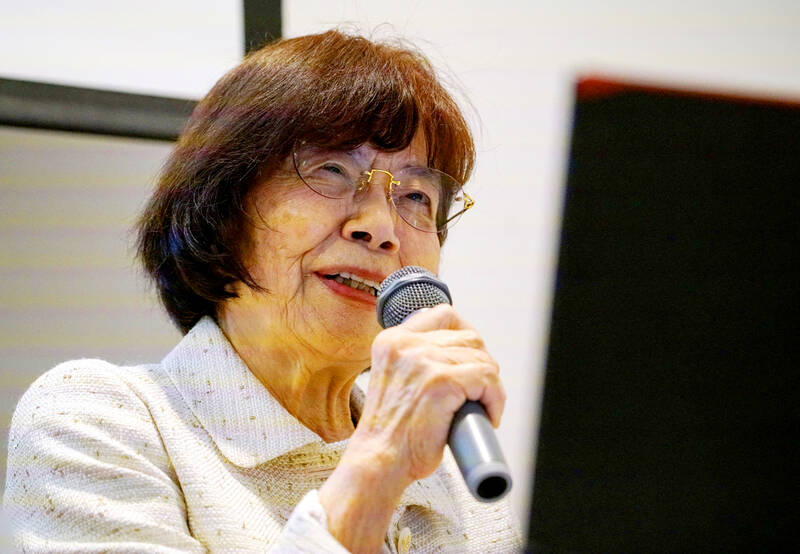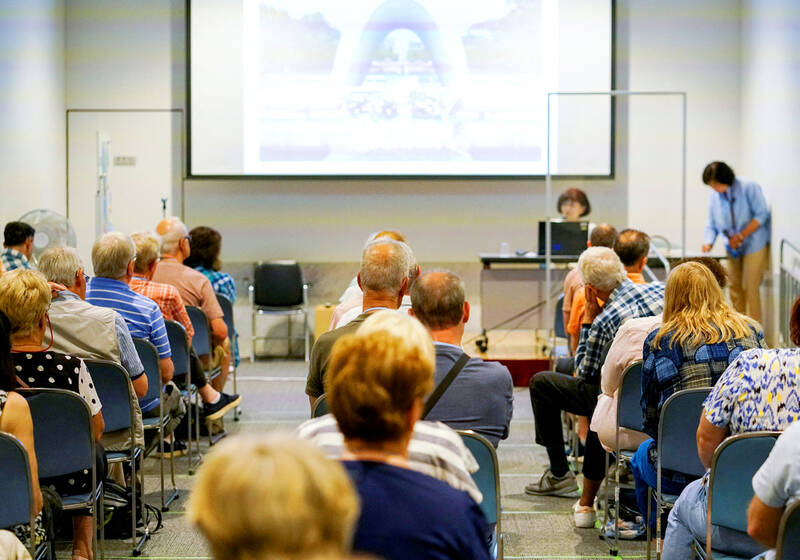Standing at the front of a dimly lit room in the basement of the Hiroshima Peace Memorial Museum, Teruko Yahata’s voice broke as she recalled the morning her world changed, on Aug. 6, 1945.
“All of a sudden, the entire sky flashed and was illuminated in bluish-white, as if the heavens had become one huge, fluorescent light,” the 85-year-old, speaking in English, told an audience of British tourists on a recent Tuesday.
“I immediately fell to the ground and lost consciousness.”

Photo: Reuters
Yahata is a hibakusha, a survivor of the atomic bomb dropped on the city of Hiroshima by the US. The bomb killed tens of thousands instantly; scores more suffered long-lasting injuries.
While talks by hibakusha have become a regular feature of the city’s memorial sites, Yahata stands out for her presentations in English.
Yahata, who was eight when she witnessed the nuclear destruction of her hometown, started traveling the world in 2013 to tell her story through an interpreter, but felt the experience lacking.

Photo: Reuters
“I had this vague dream of learning English so that I would be able to communicate in my own words, in my own voice, the dreadful power of that horrific atomic bomb and bring to life my own experience of that tragic, miserable scene, and sorrow,” she said, speaking in Japanese.
Resolving to learn English, she began taking classes at the YMCA as she headed into her 80s, and by 2021, was giving her presentations exclusively in English.
Yahata’s presentation is from a script translated by her English teacher, which she rehearses by reading along to a recording made by a native speaker. The script is covered in notes and prompts on correct pronunciation and intonation.
Yahata’s English ability is mostly limited to reading the script, but the impact of her spoken words on the audience is undeniable, moving some to tears.
“It feels very real still, when she speaks; she brings it like it’s happening today. She makes you feel that way,” said Briton Denise Hickson, visiting from Bristol.
Japanese Prime Minister Fumio Kishida is hosting the G7 summit in Hiroshima, his home constituency, starting on Friday. He is expected to give his guests a tour of the peace memorial and have them meet with atomic bomb survivors, as part of his efforts to convey a vision for a world free of nuclear weapons.
Although that vision seems more distant now with Russia threatening to resume nuclear tests and neighboring North Korea developing its own nuclear arsenal, Yahata’s expectations for G7 leaders are lofty.
“I want the G7 leaders to bring with them the vision of abolishing nuclear weapons,” she said. “I don’t want them to just talk about ideals or release a written resolution. I want them to take the first concrete step.”

The canonical shot of an East Asian city is a night skyline studded with towering apartment and office buildings, bright with neon and plastic signage, a landscape of energy and modernity. Another classic image is the same city seen from above, in which identical apartment towers march across the city, spilling out over nearby geography, like stylized soldiers colonizing new territory in a board game. Densely populated dynamic conurbations of money, technological innovation and convenience, it is hard to see the cities of East Asia as what they truly are: necropolises. Why is this? The East Asian development model, with

June 16 to June 22 The following flyer appeared on the streets of Hsinchu on June 12, 1895: “Taipei has already fallen to the Japanese barbarians, who have brought great misery to our land and people. We heard that the Japanese occupiers will tax our gardens, our houses, our bodies, and even our chickens, dogs, cows and pigs. They wear their hair wild, carve their teeth, tattoo their foreheads, wear strange clothes and speak a strange language. How can we be ruled by such people?” Posted by civilian militia leader Wu Tang-hsing (吳湯興), it was a call to arms to retake

This is a deeply unsettling period in Taiwan. Uncertainties are everywhere while everyone waits for a small army of other shoes to drop on nearly every front. During challenging times, interesting political changes can happen, yet all three major political parties are beset with scandals, strife and self-inflicted wounds. As the ruling party, the Democratic Progressive Party (DPP) is held accountable for not only the challenges to the party, but also the nation. Taiwan is geopolitically and economically under threat. Domestically, the administration is under siege by the opposition-controlled legislature and growing discontent with what opponents characterize as arrogant, autocratic

Desperate dads meet in car parks to exchange packets; exhausted parents slip it into their kids’ drinks; families wait months for prescriptions buy it “off label.” But is it worth the risk? “The first time I gave him a gummy, I thought, ‘Oh my God, have I killed him?’ He just passed out in front of the TV. That never happens.” Jen remembers giving her son, David, six, melatonin to help him sleep. She got them from a friend, a pediatrician who gave them to her own child. “It was sort of hilarious. She had half a tub of gummies,